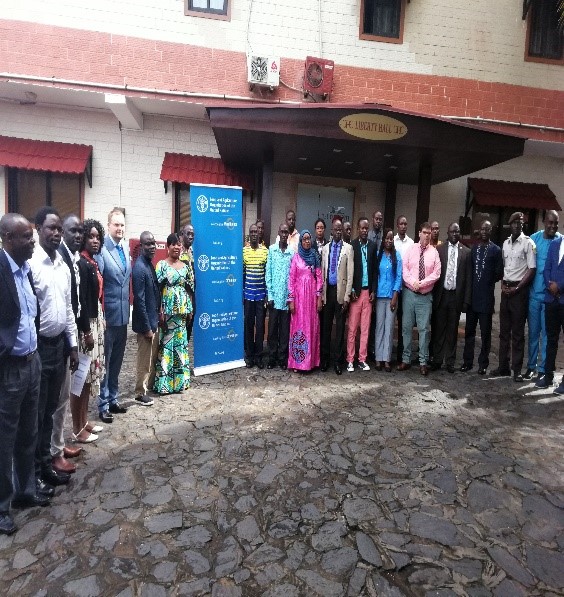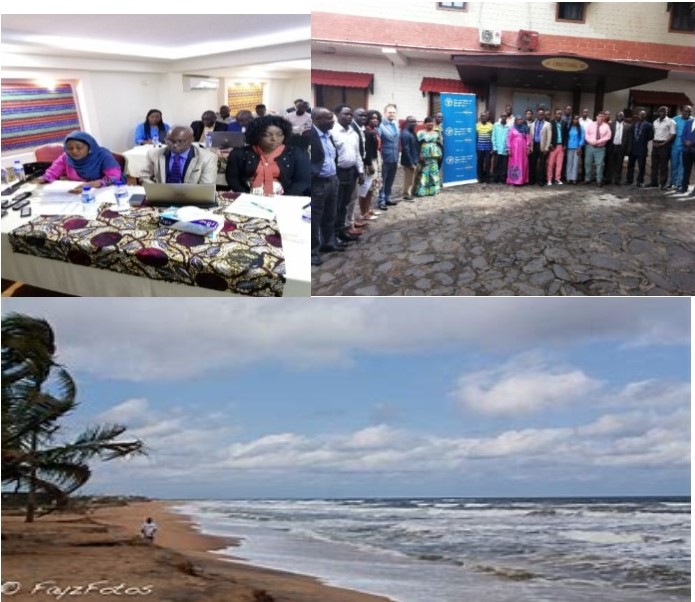-Says NaFAA Deputy DG, as FAO pledges continuous support
The Deputy Director General for Technical Services at the National Fisheries and Aquaculture Authority of Liberia (NaFAA) has said that the Liberia is losing millions in revenues to illegal fishing.
Mr. William Y. Boeh was speaking Monday at a local hotel in Monrovia at the start of a week-long workshop to formulate a National Strategy and Action Plan at for compliance with the 2009 FAO agreement on the Port State Measure. It is to prevent, deter, and eliminate illegal, unreported and unregulated fishing.
NaFAA’s Deputy Director General for Technical Services disclosed that Liberia loss approximately US$70 million during the period from 2010 to 2016.
Mr. Boeh alarmed that illegal fishing threatens fisheries resources and marine ecosystems, and undermines national and regional efforts to manage sustainably and conserve marine biodiversity, according to a press release from NaFAA.

According to him, IUU fishing severely affects coastal and Small Island developing states that are heavily dependent on fisheries for national economics, employment, peoples’ livelihoods, food security and the marine environment.
Declaring the weeklong technical workshop on IUU fishing opened, Mr. Boeh disclosed that Liberia still lacks the capacity to enforce Port State Measures and the provision of complementary international instruments and regional mechanisms.
Disclosing Liberia’s accession to the Agreement on the Port State (PSMA) the NaFAA’s Director for Technical Services mentioned that Liberia deposited its instrument of accession to the Agreement on Port State Measures (PSMA) to prevent, deter and eliminate Illegal, Unreported and Unregulated (IUU) fishing. He mentioned that the PSMA came into force in Liberia on 21st June 2019, making Liberia the 61st Party to have ratified the Agreement. Liberia is the eighth country from the 12 coastal countries of West Africa to have ratified the PSMA, clearly demonstrating the region’s increased commitment and efforts to block fish caught from IUU fishing from being landed at its ports, and reaching national and international markets.
Mr. Boeh however said that Liberia has strived in the fight against IUU even before its accession to the Agreement on Pot State Measures. Speaking further, Mr. Boeh stated that in 2009 a moratorium was placed on industrial fishing activities so as to begin work in restoring sustainable fishing practices and while the moratorium remained in forced, a new fisheries regulations was developed to help manage the sector.
He said following the regulations, a fisheries monitoring center was established to monitor the activities of vessels at sea. An observer and inspectorate programs were also established to collect fisheries scientific data and to inspect vessels both in port and at sea.
The NaFAA Technical Services Deputy Director pointed out that the institution managing fisheries in Liberia became fully autonomous in 2017 which is now as the National Fisheries and Aquaculture Authority (NaFAA) and NaFAA has a clear mandate to manage and develop Liberia’s fisheries sector. He said the proposed intervention will also include support to implementation of voluntary Guidelines for securing sustainable small scale fisheries in the context of food security and poverty eradication (the SSF Guidelines) for the government, Fishery Workers, Private Sector, Civil Society Organizations, etc.
The issue of Illegal, Unreported and Unregulated fishing has reached an alarming proportion across the world with Liberia, a coastal State, being of no exception as several fish species are leaving the Liberian waters particularly in the South-eastern part, including Grand Bassa, Rivercess, Sinoe, Grand Kru and Maryland Counties. In those locations there are several daily illegal fishermen fishing intensively without forming a part of the Liberian government fisheries records despite their huge catch, which negatively impact the economy.
The ongoing workshop is part of efforts to combat Illegal, Unreported and Unregulated (IUU) fishing across the world, which the United Nations Food and Agriculture Organization, at the 60th Session (Rome, 18-23 November 2009) of the FAO conference approved the 2009 Agreement on Port State Measures (the PSMA) to prevent, deter and eliminate IUU fishing, coupled with the effective implementation of complementary international instruments and regional mechanisms, that provides for a potent and cost effective global framework to combat IUU fishing.
Speaking earlier, FAO Country Representative Mariatou Njie revealed that the PSMA workshop is aimed at increasing awareness of the international and regional frameworks for the implementation of port, flag, coastal and market state responsibilities, as well as to undertake an initial review of existing polices and legislation, institutional arrangements and monitoring, control and surveillance (MCS) system and operations.
Mrs. Njie also said the workshop is intended to define a course of action for the introduction of provisions and procedures consistent with the PSMA and related international instruments and regional mechanisms to combat IUU fishing and identify capacity-building needs for the implementation of the PSMA and complementary international instruments.
The FAO Country Representative said “the key output of the workshop will be a National Strategy and Action Roadmap, which will enable FAO and other donors to plan support activities within the framework of the specific Japanese funded project and other similar initiatives.
Madam Njie mentioned that FAO remains committed to working closely with the government of Liberia and all relevant stakeholders in the Agriculture, Fisheries and other Natural Resources Sector for the attainment of its desired development goals.
She furthered said that the five -days technical workshop taking place in Monrovia is funded under the protect “support to implementation of the 2009 FAO Port State Measures and the Voluntary Guidelines for Securing Sustainable Small-Scale Fisheries for sustainable fisheries and maritime security in the Gulf of Guinea”.
Moreover, the FAO Country Representative stated that goal of this project is to build capacity of governments of Liberia and Sierra Leone (fishery workers, private sector CSOs among others) to improve sustainability of maritime fisheries by preventing, deterring and eliminating maritime security in the Gulf of Guinea.
Meanwhile, the workshop is bringing together participants from fifteen different institutions including the Liberia Maritime Authority, Ministries of Justice, Defense, Agriculture, Commerce, National Public Health Institute, Environmental Protection Agency, National Port Authority, Liberia National Police, Liberia Immigration Service, the Co-Management Association and the Liberia Artisanal Fishermen Association.

